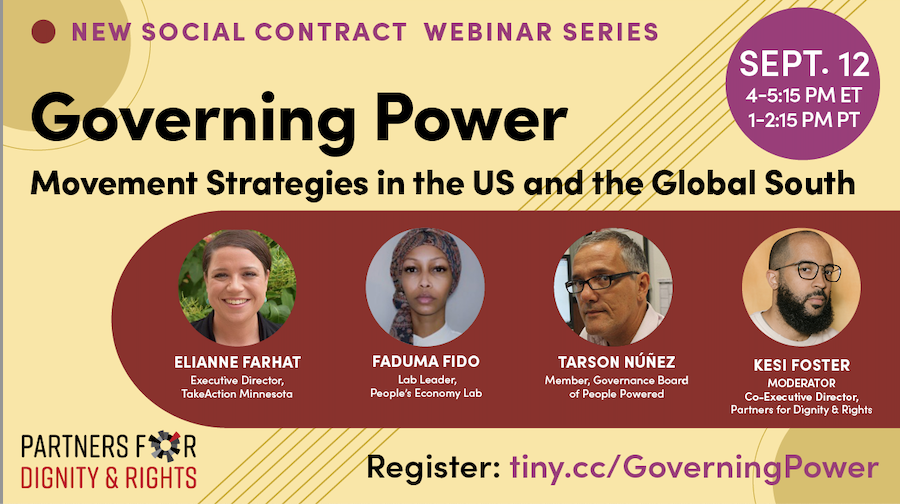Watch: Governing Power: Movement Strategies in the US and the Global South

Our most recent webinar looks at global strategies of liberation. Around the world, people pushed to the margins are organizing together to win power in government and the economic institutions that shape our lives. Communities are building frameworks and models to co-govern with elected officials, and transform public institutions to shape public policy and help drive implementation. From Brazil to Minneapolis to Washington state, hear from three leaders who are utilizing co-governance strategies to build a more equitable and just future for all.
Speakers:
Elianne Farhat, Executive Director, TakeAction Minnesota
Faduma Fido, Lab Leader, People’s Economy Lab
Tarson Núñez, Doctor in Political Science and member of the Governance Board of People Powered
Moderator: Kesi Foster, Co-Executive Director, Partners for Dignity & Rights
You can watch the recording of our conversation on our youtube channel.
You can read more about Co-Governance in our recent report.
BIOS:
Elianne Farhat (she/her) is the executive director of TakeAction Minnesota and has been a leader in many successful local, state and national campaigns throughout her 15 years of community, labor, and electoral organizing. Elianne’s commitment to building power in poor and working class communities of color has been a constant thread through her diverse work experience – whether that be while organizing New American voters in Chicago, electing Minnesota’s first progressive governor in more than 20 years, or advancing strategic campaigns securing historic policy wins for millions of working families. Elianne is the first in her Lebanese father’s family to be born in the United States and of Lakota (Standing Rock) descent on her mother’s side. She serves on the board of People’s Action and is the recent recipient of the Joan Growe Award for Distinguished Commitment to Expanding Access to Democracy and Justice.
Faduma Fido is passionate about public service and has worked in the intersection of community and economic development over the past decade. After transitioning to Peoples Economy Lab, Faduma has focused on programs and models that elevate community participation in policy design and decision-making spaces. She believes that community-oriented programs coupled with equitable policy design is one of the most equitable ways to mitigate lack of resources for under-served communities. Faduma has a Bachelor’s in Economics and English from the University of Washington and a Master’s in Public Administration from Seattle University.
Tarson Núñez is a doctor in political science who is currently participating in a post-doctoral project at the Federal University of Rio Grande do Sul. He works as a social researcher at the Department of Economy and Statistics at the Secretary of Planning of the State Government of Rio Grande do Sul. His experience with participatory democracy started as an activist and adviser for the urban social movements in Brazil in the early eighties. At the beginning of the nineties, he worked at the Porto Alegre Municipal government, as the head of the Planning Office, in charge of the Participatory Budgeting process in the city. At the beginning of the two-thousands, he was the director of the Urban and Regional Development Department of the state government, when they launched PB at the state level. In the same period, he worked as a volunteer in the first versions of the World Social Forum in Porto Alegre. He is also a member of the governance board of People Powered, an international association for participatory democracy.
